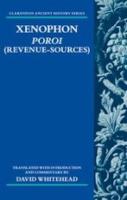
Oxford: Clarendon series (2019) h/b 340pp £80 (ISBN 9780198834427)
Xenophon’s Poroi has been traditionally been translated ‘Ways and Means’ after the government committee which from 1641-1967 advised on the budget, particularly on raising revenue. W.’s translation (there is no Greek text) fits the bill very well.
Perhaps because of the easy elegance of his prose, Xenophon does not often strike the reader as a man given to original thought. Poroi, all 3,935 words of it, may be the exception that proves the rule. In 357 BC the members of the Second Athenian League revolted against the exactions that Athens was increasingly making upon them. This ‘Social War’—i.e. of those who were once socii—lasted till 355 when Athens lost her naval hegemony and allowed those who so wished to go their own way. That left Athens in dire financial straits.
In Poroi Xenophon proposes the measures that Athens should take in order to survive under these new and challenging conditions. He advises a long period of peace and building up revenue by—and here his work has an especially ancient and modern ring to it—improving the yield from land and sea, welcoming into Athens more revenue-raising foreigners on especially favourable terms, start-up capital (aphormê), state ownership of merchant-ships, and buying and then hiring out up to 10,000 state-owned slaves (at a daily rate) to work in the silver mines in Laurium, which might even raise enough to enable the state to offer free handouts to the poor.
W. dates Poroi to 355/4 rather than the 340s, given that (among much else) by 346 Athens had recovered financially. He finds no secure evidence that it was written in Athens or indeed that Xenophon ever returned there, and regards it as a deliberative pamphlet, designed for a discussion that had already begun rather than, say, as an actual speech to the boulê. Pointing out that virtually none of Xenophon’s proposals were immediately followed up by Euboulos, the politician mainly responsible for overseeing Athens’ financial recovery at that time—here W. follows the commentary of Philippe Gauthier (1976) to which he pays handsome tribute throughout—he agrees that Poroi was more likely to have been influential in the later Lycurgan period, after Philip of Macedon’s conquest of Greece in 338 BC. This period saw a massive increase in Athens’ annual revenues (c. 1,200 talents, by Plutarch’s account) which could have come about only through commerce i.e. metics, foreigners and income from the silver mines, for all of which W. finds persuasive evidence.
W. also makes the case for the originality of much of what Xenophon had to say. He explains Gauthier’s failure to understand this with reference to the work of M.I. Finley, who (to put it simply) did not think the ancients ‘did economics’ in our sense: the crucial point is that in Poroi it is transparent that ‘trading activity (and its by-products) is something to be actively monitored, fostered and enlarged by the citizens themselves’, including (against Finley) exports.
There follows an Appendix on the 400 dedicated metic ‘freedom bowls’, Notes on problems in the Greek text, the translation (a mere 12 pages in a 340 page volume!), the full, detailed, authoritatively argued 206pp commentary, an appendix on [Aristotle’s] Oikonomika, Bibliography and Index.
Two observations: it is policy for the Clarendon series not to print the original text. Since the text is so short, this seems an odd decision, given just how much Greek (most, but not all of it, transliterated) appears throughout. Secondly, the translation is a slightly turgid read, keeping as it does unnecessarily closely at times to the Greek. For example, καὶ/ἀλλὰ μήν is translated ‘Another point: …’ four times in succession in the opening three chapters, though differently thereafter. (Waterfield’s excellent translation (in Xenophon: Hiero the Tyrant and Other Treatises [Penguin, 1997, updated 2006]), which Whitehead generously credits and often discusses, makes a better read.)
Neither observation in any way affects the conclusion: this is a masterful, much-needed commentary, on a document of very great interest, that will stand the test of time.
Peter Jones
